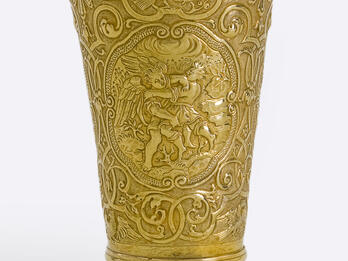Pariz un Viene (Paris and Vienna)
Elye Bokher
1508/9
Canto One
Here I begin; listen to me, great and small.
Once there was a mighty king—as in the stories begun by girls. His peer in virtue was not to be found. He had a land that was stately indeed. He filled his days with love and peace and pleasures. Vienne the Fair was the name of his capital city. One could not make a circuit of it in a month…
Creator Bio
Elye Bokher
Elye Bokher (Elijah ben Asher Levita) was a Hebrew grammarian as well as a scholar and poet. He was born in Neustadt, Germany, and after Jews were expelled from his hometown, he moved to northern Italy, first living in Padua, then in Venice and Rome. He later returned to Germany before finally returning to Venice, where he died. During his years in Rome, Levita lived under the roof of the Renaissance humanist and cardinal Egidio da Viterbo, who was his patron. Levita wrote extensively in Hebrew and in Yiddish in various genres: poetry, prose, and treatises on grammar, dictionaries, and more.
Related Guide
Early Modern Italy: Where East and West Meet
Ashkenazim, Sephardim, and Marranos encountered each other in Italian cities, developing community structures that later influenced Jewish communal organization throughout the western world.
Related Guide
Early Modern Jewish Languages
As Ashkenazi and Sephardi Jews migrated eastward, Yiddish and Ladino emerged as distinct languages. Both languages developed literary traditions, as print became more widespread.
Related Guide
Early Modern Literature and the Arts
Jewish literary creativity flourished in the early modern period, dominated by Hebrew poetry that blended religious themes with Renaissance forms.
This Old Yiddish chivalric romance was first printed in Sabbioneta in 1556. Because of various similarities with the Bovobukh, many scholars attribute Paris un Viene to Elye Bokher. Indeed, both are written in ottava rima (eight-line stanzas with the rhyme scheme abacabcc), both are (significantly condensed) Yiddish adaptations of Italian chivalric tales that Judaize characters and details; they also share linguistic, structural, and rhyme elements. However, some argue that Paris un Viene was written after Elijah’s death, possibly by a member of his circle. Based on a tale that circulated extensively in medieval Europe and in various different versions, the romance describes the adventures of the knight Paris, who falls in love with the king’s daughter, Viene. However, the king does not agree to their marriage, and Paris is forced to flee the kingdom. Eventually (after numerous obstacles and the king’s attempts to find a different suitor for his daughter), the two are reunited and marry. In contrast to the famous Bovobukh, Paris un Viene did not achieve popularity among readers and fell into oblivion until it was rediscovered in the modern period.
You may also like
Bovo d’Antona (Bovo of Antona)
Sreyfe-lid (The Song about the Burning)
Di sreyfe fun Venedig (The Great Fire of Venice)
Debate between Wine and Water
The War of the Holy Days



